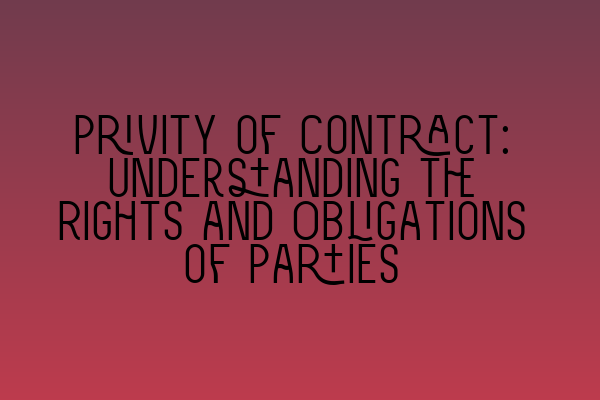Privity of Contract: Understanding the Rights and Obligations of Parties
In the world of contract law, the concept of privity is of utmost importance. Privity of contract refers to the relationship between the parties to a contract and the rights and obligations that arise from that relationship. It is vital to understand the intricacies of privity in order to navigate the complex landscape of contractual agreements.
When two or more parties enter into a contract, they create a legal relationship with one another. This relationship establishes certain rights and obligations that each party must adhere to. However, privity limits the scope of these rights and obligations to only those parties who are directly involved in the contract.
One key aspect of privity is that it prevents a third party from enforcing the terms of a contract. This means that only the parties who have actually entered into the contract have the ability to sue or be sued for breach of contract. For example, if Party A enters into a contract with Party B, Party C (a third party) generally cannot bring a lawsuit against either Party A or Party B for any breaches of the contract.
However, there are exceptions to the general rule of privity. In certain situations, a third party may have the ability to enforce a contract if they fall under one of the recognized exceptions. These exceptions include:
1. Beneficiary Contracts: When a contract is made for the benefit of a third party, that third party may have the right to enforce the terms of the contract. For example, if Party A enters into a contract with Party B to pay Party C a sum of money, Party C can enforce the contract as the intended beneficiary.
2. Agency: If a party is acting as an agent for another party, the principal may be bound by any contracts entered into by the agent on their behalf. This allows for indirect enforcement of the contract by a third party.
3. Assignment of Rights: If a party to a contract assigns their rights under the contract to a third party, that third party may then have the ability to enforce the contract. However, this does not typically transfer the original party’s obligations under the contract.
Understanding the nuances of privity is crucial when negotiating and drafting contracts. It is important to clearly identify the intended parties and any third parties who may be affected by the contract. Failing to consider privity may result in unintended consequences or potential legal disputes.
To ensure a comprehensive understanding of privity and other important contract law concepts, it is highly recommended to take courses and engage in practical exercises such as mock exams. You can find helpful resources like SQE 1 Practice Exam Questions and SQE 1 Practice Mocks FLK1 FLK2 to sharpen your knowledge and skills.
Additionally, for those preparing for the SQE exams, both for SQE 1 and SQE 2, it is crucial to be well-prepared. SQE 2 Preparation Courses and SQE 1 Preparation Courses can provide you with the knowledge and guidance you need to succeed in these exams.
Lastly, it is essential to stay updated on the latest SRA SQE Exam Dates to ensure you are aware of important deadlines and can plan your study schedule accordingly.
In conclusion, privity of contract is a fundamental concept in contract law that dictates the rights and obligations of the parties involved. Understanding the limitations of privity and the exceptions to the rule is vital in order to have a clear understanding of contractual relationships. By taking advantage of educational resources and staying informed, you can further enhance your understanding of privity and other key components of contract law.
